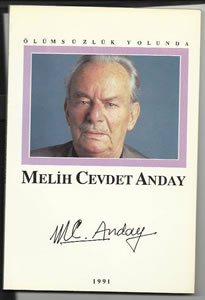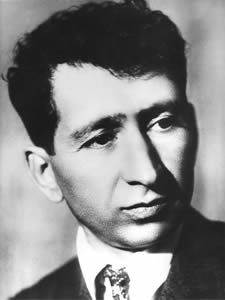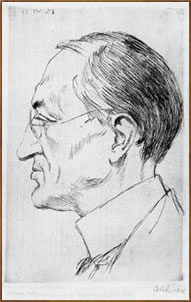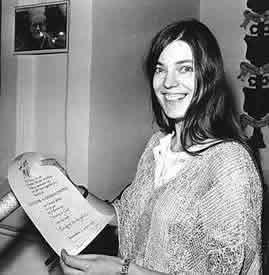|
De Turkse dichter Melih Cevdet (eig. Melih Cevdet Anday) werd geboren op 13 maart 1915 in Istanboel. Zie ook alle tags voor Melih Cevdet op dit blog.
xml:namespace prefix = o ns = "urn:schemas-microsoft-com:office:office" />
A Poem in the Manner of Karacaoglan
VI
No one celebrates the Elbistan meadow.
It opens its arms to the wind like dawn, a refined gazelle.
Summer brings the balmy weather of the time I knew,
Like a nightingale singing in fresh, hanging grapes.
Hesitant morning sets the purple hyacinth free.
Delight I've never known extracts lies from my heart
And it enjoys, for a time, the quince in the branches.
A crane flaps its wings, sapling of dawn.
I know well Ismail Bey's high plateau with its cold running waters,
The rose's branch, as tall as four men, that winds around the cypress,
High up and coiled in the fog, with an aroma like wine.
There you can see the heavy-headed pool quake
Like purple clouds that deceive the birds.
It's time for the ant that never knew childhood to grow up,
The sun droning like a cicada, an idol like a man,
The shouting flower of my freedom, respected.
The weeds whisper into the ear of the stream,
The heart's flower comes down to earth from the heights.
One can see a falcon's nest in the Koja Binboğa,
Its morning flowers dazzle the eye,
They pulse in the heart of wind like the chiming of a bell.
In the moonlight dragons descend with their eyes full of stars
To the valley where thousands of flowers play . . .
Tonight, tonight let's sleep in the Binboğa, my horse.
Vertaald door Sidney Wade en Efe Murad

Melih Cevdet Anday (13 maart 1915 28 november 2002)
De Armeense dichter Yeghishe Charents werd geboren op 13 maart 1897 in Kars (toen Rusland, nu Turkije). Zie ook alle tags voor Yeghishe Charents op dit blog.
Toward The Future
My infinite soul is already full
With confusing songs and also noises;
My electric heart is already full
With inflamed currents.
My soul has become a radio station
For the entire world and all of mankind;
And it is so high, my soul's station,
Like Massis so high, and also so firm -
Mighty, terrible!
In these fervent days, wind-driven, confused -
The song of million hearts distant or near
It is now my fate to sing it today;
My multimillion, ten thousands of friends'
Joy of today and their great flight as well -
Today it's my song's turn to cast the fate
Of the coming days.
Therefore this is why
As a gigantic, as an Eiffelian
Enormous tower,
At past and coming centuries' threshold
Mighty, high above,
I am now standing with my entire height
And I am singing.
And my soul is now a radio station,
It is now sending its fiery red song
Far and far away; -
To all of the hearts, who live and exist
In all directions.
My soul is singing, sounding fervently.
I know in front of my song of today -
Facing the red sparks of my soul as well -
Each single soul is a radio station,
Wherever it is!
Every soul which lives, each soul which exists,
And is carrying upon its own wings
The same great concept, the immense concept
Of these fervent days, -
The radiant concept of these fervent days.
Every single soul,
Which is today with its wings of iron
Ringing and rustling -
And is searching for new rest and lulling
In the uproar of million rebel wings...
Do you know, that now
Here -
In my ruined country of Nayiri
And far - far away -
Inside red Moscow,
At yellow Tibet,
At San Francisco, enormous London
And at Singapore -
In all locations, in all directions
The world is pregnant with a novel song?
Far away- and near
Inside the mine pits,
At the factories,
In the wide steppes and in the forests -
In all locations, in all directions,
My brothers, thousands, who're lulled with the song
Of iron and of bronze, of the soil and mines!
Who possesses our will of fire today,
Our blood-red power
Our fervent fortune
So universal?
Who has them today...?
It's us who are new, we're tens of thousands!
Like an enormous disc made of iron
The brave will of our thousands of brothers,
So universal -
We have already thrown with immense force
Toward all the winds of the coming days,
Toward - the Future...

Yeghishe Charents (13 maart 1897 29 november 1937)
De Duitse dichter Oskar Loerke werd geboren op 13 maart 1884 in Jungen. Zie ook alle tags voor Oskar Loerke op dit blog.
Sommernachts über Land
Von Rüstern schauert die hängende
Ernte der Traurigkeit;
Schon steigt aus Wurzeln die drängende.
die untere Ewigkeit.
Aus Brunnen krümmt sich der tastende
Verwesende Nebel und klimmt.
Aus Löchern kommt das fastende
Grauen und nimmt und nimmt.
Hat der Horizont seine klagenden
Harfen zum Klagen gebracht?
Die Erde hat ach die tragenden
Schollen zu Wolken gemacht.
Die Nähe voll bitter steigender
Schluchzer wird ungewiß.
Der Himmel steht wie ein schweigender
Berg der Kümmernis.
Der Kümmernisberg steht gläsern still,
Vor alle Ziele gestellt.
Und wer in süßere Meilen nun will,
Dem steht er vor der Welt.

Oskar Loerke (13 maart 1884 24 februari 1941)
Portret door Emil Orlik, 1921
De Nederlands schrijfster Hermine de Graaf werd geboren in Winschoten op 13 maart 1951. Zie ook alle tags voor Hermine de Graaf op dit blog.
Uit: Een menukaart is de maaltijd niet (Bespreking van De Graafs werk door Daan Cartens)
Haar hoofdpersonen heten Klaar(tje), Katja, Daphne of Stella, maar de personages in het werk van Hermine de Graaf gedragen zich allerminst op een stereotiep meisjesachtige manier, zoals hun wat oubollige namen misschien zouden doen vermoeden. De tieners van De Graaf zijn doorgaans slim, onhandelbaar, destructief; ze doorzien vaak op een verrassend heldere manier de volwassen wereld, maar weigeren zich te schikken naar de regels van de ouderen; ze kunnen niet op een rationeel-analytische manier greep op de wereld of de werkelijkheid krijgen, maar vaak wel op een associatieve of intuïtieve wijze. De bezweringsmogelijkheden die de taal biedt, spelen daarbij een voorname rol. Zo samengevat worden vooral de psychologische elementen benadrukt en dat gebeurde ook steevast in de meestal positieve kritieken die Hermine de Graaf ten deel vielen na de verschijning van Een kaart, niet het gebied (1984), De zeevlam (1985) en Aanklacht tegen onbekend (1987), alledrie verhalenbundels.
Vreemd of merkwaardig is dat accent nu ook weer niet, want vooral in haar debuut beschreef de in 1951 geboren De Graaf een gedrag dat tot dan toe in de Nederlandse literatuur behoorlijk was verwaarloosd. Het aantrekkelijke van Een kaart, niet het gebied was dat de lezer eerst werd geconfronteerd met de nogal afwijkende omgang met alles en iedereen van pubermeisjes in het algemeen en hoofdpersoon Klaar in het bijzonder, voordat de auteur in het laatste verhaal Snoepjesjacht op een programmatische manier haar werkwijze en thematiek expliciteerde, een thematiek die De Graaf ook in de novelle De regels van het huis (1988) en de roman Stella Klein (1990) getrouw bleef, hoe gelaagder die boeken misschien op het eerste gezicht wel leken.

Hermine de Graaf (Winschoten, 13 maart 1951)
Zie voor nog meer schrijvers van de 13e maart ook mijn blog van 13 maart 2011 deel 2 en eveneens deel 3.
|



